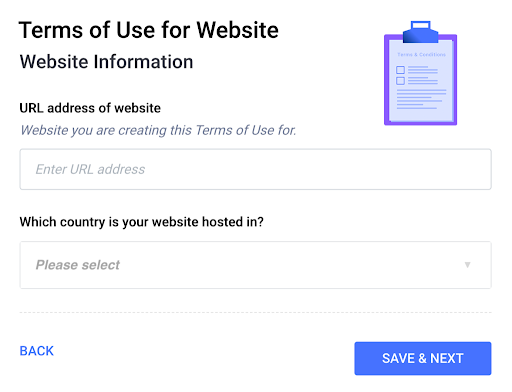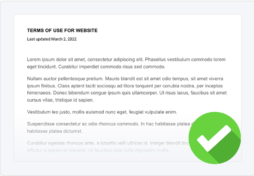You’re just about ready to launch your online business — your website or app looks great, but you still need to make a terms and conditions agreement.
You may feel tempted to copy and paste someone else’s terms and conditions, especially if you believe it might be faster and cheaper.
But copying and pasting a terms and conditions from another business is illegal and puts your business at risk.
Keep reading to learn why you shouldn’t copy a terms and conditions agreement from someone else and get helpful tips on how to make your own.
How To Make Your Own Terms And Conditions
You might think copying someone’s terms and conditions will save you some time and effort, but it has long-term legal and brand-ruining consequences.
Don’t risk it.
Easily make your terms and conditions for your business using a generator, template, or writing it yourself to stay on the right side of the law and protect your reputation with customers.
Create Your Terms and Conditions Using Termly
Here’s how to use Termly’s generator to create comprehensive and customized terms and conditions for your website or app.
Step 1: Go to Termly’s Terms and Conditions Generator.
Step 2: Answer a few simple prompts and questions, and go through all the steps until you reach “Final Details.”

Step 3: Once you’ve completed everything and are satisfied with the preview, click “Publish.”
You will then be prompted to create an account on Termly and save and edit your terms and conditions further.
Template
You can also use our free terms and conditions template to easily customize an agreement for your business.
It’s already properly formatted and includes the phrasing for common clauses that appear in most terms and conditions agreements.
Just fill in the blank sections with details about your business and add or erase clauses as necessary to ensure that it meets your unique needs.
DIY
You can also write your own terms and conditions agreement; here are our tips to help simplify this process:
- Ensure you know what laws apply to your business, both privacy and industry-related.
- Make an outline for your agreement to help with formatting and clarity.
- Pick all clauses relevant to your business so you don’t leave out any essential details.
- Write the details of each clause using clear, straightforward language.
- Link to other necessary legal and website policies within your terms and conditions.
- Finally, post your final agreement in multiple spots throughout your website or app.
The good news is you don’t need a lawyer to make a terms and conditions agreement.
Plenty of free, reliable resources exist to help businesses make these policies.
Instead of copying and pasting someone else’s work, take advantage of these assets and keep your business on the right side of the law.
What Is a Terms and Conditions and Do I Need One?
A terms and conditions agreement is a policy that communicates the rules, responsibilities, disclaimers, and other important information that protects your businesses and that you expect users of your site or app to follow.
Even though terms and conditions agreements aren’t required by any laws, it’s a best practice for any business that operates online to post one.
Presenting users with one of these policies helps explain the following types of information:
- Acceptable and prohibited behaviors and activities.
- When you retain the authority to remove a user from your platform.
- Details about your payment terms.
- How users can delete their accounts.
- Governing laws and dispute resolutions.
- Your copyright details and what intellectual property rights you’re retaining.
- Other essential disclaimers, like a limit of liability or no responsibility clause.
People often falsely believe that all terms and conditions agreements look the same, but each business is different, so the details change drastically from one company to the next.
Can I Copy Terms and Conditions?
No, you cannot copy a terms and conditions agreement from someone else.
Copying another business’s terms and conditions is illegal and will ultimately do more harm than good for your business:
- Copying terms and conditions is considered a form of copyright infringement, a punishable legal offense.
- You risk copying a policy that isn’t properly tailored to your business or website.
- Copying legal policies could damage your brand reputation and cause you to lose customers because it looks unprofessional.
Let’s discuss why you shouldn’t copy someone else’s terms and conditions in more detail.
You’ll Be Vulnerable to Lawsuits
Copying someone else’s terms and conditions can make your business vulnerable to lawsuits, possibly leading to thousands of dollars in legal fees and penalties.
Terms and conditions form a legal contract between your website or app and its users. The policy details must be specific to your activities to protect your business from legal challenges.
But if you copy another site’s policy, it won’t be tailored to your business and will likely have gaps in coverage, reducing or eliminating the legal protection it’s meant to give you.
If legal disputes arise, such as a lawsuit between your site and a user, the terms and conditions you copied won’t make for a strong defense in court.
Plus, you have no way of knowing if the website you’ve copied your policy from ever consulted a lawyer or if they copied any of the details of their agreement.
You can easily prevent these risks by simply making your own unique policy and not using someone else’s.
You Could Be Fined for Copyright Infringement
If you copy someone’s terms and conditions, you could get fined for copyright infringement.
Legal policies, like terms and conditions, are protected by copyright, so using someone else’s document is illegal under U.S. copyright laws.
In the best-case scenario, if your competitor finds out you stole their policy, they might send you a cease and desist.
But if you operate in a smaller industry, there’s a good chance that word will get around that you’re stealing materials from other companies, and your reputation could take a hit.
Plyu, you’ll still need to develop your own unique (not copied) policy.
In the worst-case scenario, you end up in court for copyright infringement.
Avoid copyright violations and the costs of a court case by writing original terms and conditions.
You Will Lose Customers
If users discover you copied your terms and conditions from a different company, you risk losing them as potential customers because they may feel they can’t trust your business.
A terms and conditions agreement protects your business and users by outlining the rules of your site.
Users expect to have access to these rules and will quickly discover if they are copied from another site, for example, they might:
- Find a reference to a completed different company
- Notice a lack of site-specific information
- Read dispute resolutions or governing laws that fall outside of your legal jurisdiction.
- See incorrect contact information that leads them to another business.
This may make your business look unprofessional and makes your website look insecure.
According to Salesforce research, 54% of users say it’s harder than ever for companies to earn their trust — copying legal documents is not worth it.
Summary
Terms and conditions agreements might look similar at first glance, but if you read them, you’ll realize how different each one is.
No two businesses are the same, so copying someone else’s policy will likely not have all the details your company requires to protect you and your consumers.
If caught copying other people’s legal policies, you could be charged with copyright infringement or cause irreparable harm to your business reputation.
There’s no reason to copy and paste this document from another business — instead, use our free terms and conditions generator, which is easy, fast, affordable, and compliant.


